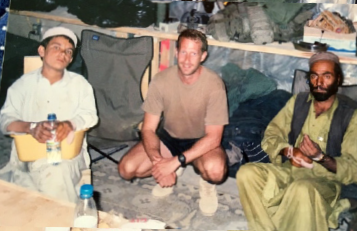
Reeling from 12 nonstop chaotic, heart wrenching days and one mass casualty event, our Shock Trauma Platoon Officers wait to fly out, grateful to be alive and leaving. Despite these smiles, sadness lingers with the knowledge of how many lives have been lost during the recent attack at Abbey Gate and the knowledge of how many Afghan families have been affected by the withdrawal. (See photo 5) ̶ Kat Landa, MD, FACEP
Explore This Issue
ACEP Now: Vol 41 – No 01 – January 2022Most of you probably remember exactly where you were and what you were doing on Sept. 11, 2001. A few weeks earlier, I had just arrived in New York to begin medical school. I took a photo from a ferry in the Hudson River on Aug. 25, 2001. Weeks later, while sitting in the lecture hall at NYU School of Medicine, my friends and I heard about a small plane crashing into one of the Twin Towers, setting it ablaze. At the end of the lecture, we rushed to the rooftop of Rubin Hall and stood horrified as the dust blowing to the east of the North Tower cleared just enough to reveal that the South Tower had already collapsed. Soon, in response to the horrific terrorist attacks that killed thousands of Americans in New York, DC, and Pennsylvania, our country would be at war, one that lasted a generation and one that emergency physicians from our Government Services Chapter have played an integral part. These reflections explore the memories of our service members and colleagues from 9/11, through the Global War on Terror, and to the final days of the withdrawal from Afghanistan. (See photos 1 and 2) —Cedric Dark, MD, MPH, FACEP, MEIC

PHOTO 1: A view from the Hudson River in August 2001.

PHOTO 2: The smoke emanating from the North Tower of the World Trade Center blurs with the debris cloud formed by the collapse of the South Tower.
Fighting for What’s Right
Bret T. Ackermann, DO, FAAEM, FACEP, Colonel, US Army (Retired)
I was a member of a medical team supporting multiple elements of U.S. Special Operations Command (USSOCOM) in Afghanistan 2004–2005. During this time, most of the public’s attention was on the war in Iraq, although combat operations were continuously occurring throughout Afghanistan. When not supporting direct action elements of USSOCOM, my medical team provided medical and surgical care to the local population, who had long-term sequelae of injuries sustained during Afghanistan’s war with the USSR or as a result of the unexploded ordinance leftover from that war. Thank you very much to the men and women of the U.S. and coalition partners with whom I served, and a special thank you and respect to the Afghan men and women who have known nothing but war and terror for generations yet continue to fight for their people and ideals. (See photos 3 and 4)

PHOTO 3: This child (left) and gentleman (right) sell DVDs at the local bazaar; after Dr. Ackermann’s team repaired their injuries, they gave the team a pretty good discount on their sales.

PHOTO 4: Dr. Ackermann on patrol in Afghanistan.
—
Pages: 1 2 3 4 | Single Page


No Responses to “ACEP Government Services Chapter Docs Reflect on Time in Afghanistan”